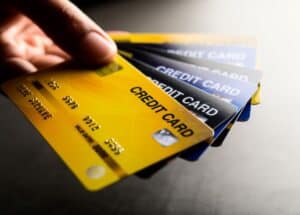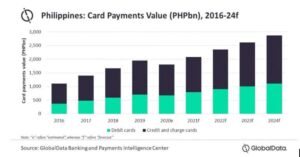In the Philippines, there are just 8.6 million credit cards in use, according to a study done by GlobalData in 2021. (compared to 90.6 million debit cards).
Numerous stereotypes and fallacies about credit cards often influence people’s decisions.
As a result, the majority of people who earn a living refrain from using credit cards because they have heard horror stories about how using them might lead to debt, unplanned costs, or other unfavorable financial outcomes.
Let’s address the straightforward query, “What is a credit card?
How do credit cards work?
Simply put, a credit card is a mechanism for you to borrow money from a bank to buy something, regardless of how cheap or expensive it is, without having to bring actual cash with you.
You won’t incur additional costs if you repay the money you borrowed with a credit card within a month. You must pay an additional sum known as “interest” if you don’t make your payments on time.
Types & Categories of Credit Cards
Typically, credit cards are grouped based on their major function and advantage.
An airline-specific credit card, for instance, will reward your regular travel with generous incentives. On the other hand, balance transfer cards enable you to transfer your credit balance from other cards and benefit from the new bank’s low-interest rate promotion.
Let’s examine the various credit card categories and their applications.
Standard credit cards
Your standard credit card gives its owner access to a line of credit.
- Balance transfer credit cards: The primary selling point of this card is typically the ability to transfer balances at 0% interest from other credit cards you may already have. It enables you to transfer debt with high-interest rates from other cards to one with a new card that has a matching interest rate of zero or low (duration depends on the terms of the offer)
- Cards with low-interest rates: Customers are drawn to them because they typically provide competitive interest rates for the first year of card use. Check the offer’s terms and conditions so you’ll know if and when the regular rates begin to apply.
Credit cards that offer rewards
The points are what matter most. Every time a user uses this kind of credit card, they receive rewards. Similar to the loyalty point system at your neighborhood grocery shop, the user will receive specific benefits in exchange for their points.
- Credit cards with cashback. The more often you use the card, the more money you’ll get reimbursed. For a predetermined minimum purchase amount made with the card, you will receive a certain amount of cash as compensation. For illustration, receive 10 pesos in cash for every 1000 pesos you spend using the card.
- General credit cards with reward points. A similar idea applies to cash-back cards, but the incentives might be in the form of goods, presents, fuel, hotel rooms, and other things.
Credit cards for frequent flyers or airline miles
The incentives offered here are just for plane travel. Every time you use a frequent flier card, you earn airline miles as well as additional perks.
- Specific credit cards for airlines. The credit card provider typically has agreements with airlines and rewards cardholders with airline miles. These accrued miles can be used for complimentary flights on that specific airline. Exclusive access to VIP lounges, travel insurance, and other benefits are also available at individual airports.
- Cards with general airline miles. You can use your card to earn reward points that you can then use on the airlines of your choice, rather than being restricted to just one type of airline (provided it’s supported). However, since you can’t earn extra points when you fly with this kind of card, they fall short in terms of benefits when compared to airline-specific cards.
Cards with bad credit or credit repair
- Cards with a guarantee. intended for those with less-than-ideal credit ratings. This kind of card typically requires an initial cash deposit as collateral so that the bank would have more “security” in issuing your line of credit. Other types of personal property and assets with a monetary value are accepted as collateral by some banks.
- Prepaid credit cards. Functions just as they should. People using prepaid credit cards are able to use credit to make purchases up to the amount that has been loaded into the card. similar to a debit card. Annual fees and other costs are often waived for prepaid credit cards.
Specialty credit cards
These cards were created with particular bonuses that are most appealing to the kinds of buyers from each market area (business or student). The bonuses and features it offers to set it apart from ordinary credit cards even though they generally share the same attributes.
- Business Credit Cards. These cards are ideal for usage in the workplace. It typically includes the ability to separate personal and company costs, as well as business-specific awards and bonuses, greater credit limits, expense management reports (for tracking), and the opportunity to issue extra cards for staff.
- Credit Cards for StudentsThis one is more well-liked elsewhere. It functions as a “starter” credit card for college students (who usually are not qualified yet for a standard credit card). These are often designed for university students to pay for tuition fees and start developing a positive credit history (very important in other countries)
Please read: TIPS TO HELP MILLENNIALS IMPROVE THEIR CREDIT SCORES
How to Apply in the Philippines for a Credit Card
Banks in the Philippines have a specific procedure for vetting first-time credit card applications.
They embody the ideal cardholder archetype and template. pays bills on time and lives within his means. Here are some suggestions to persuade regional, and domestic banks to approve your credit card.
- Stable source of income is a must
- Start with a deposit account
- Apply for a secured credit card
- Maintain a credit profile
- Reduce your debt-to-income ratio
- Don’t do follow-ups
Best Credit Cards in the Philippines
- Citizens Cash Back Card
- Next Mastercard Security Bank
- Card EastWest Platinum
- Card BPI Amore Cashback
- Gold RCBC Bankard Card
- Mastercard HSBC Red
- Easy MasterCard AUB
- First BDO Diners Club
- MasterCard Gold from Bank of Commerce
Conclusion:
Disciplined people who can maintain awareness of their capacity to pay the monthly bill (ideally in full) on or before the due date are best suited to use credit cards. If you already know how to appropriately use a credit card, switch as many of your purchases to your credit card, and just use your debit card to access ATMs.
If you do, you will have an advantage over customers who pay with a debit card, cheque, cash, or cash because of the benefits, buyer protection, and value of cash in hand.






